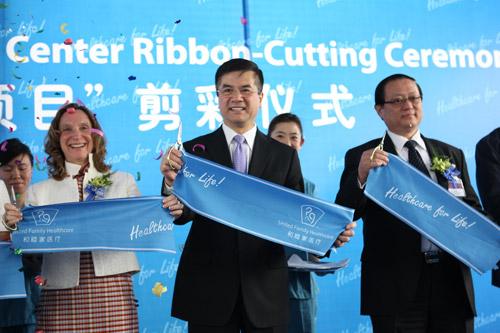 US Secretary of Commerce Gary Locke (center) attends the opening ceremony of a cancer medical center at Beijing United Family Hospital on Friday. [Yang Shizhong / China Daily]
US Secretary of Commerce Gary Locke (center) attends the opening ceremony of a cancer medical center at Beijing United Family Hospital on Friday. [Yang Shizhong / China Daily]BEIJING - US Commerce Secretary Gary Locke said on Friday that the US government is expected to completely overhaul its export control policies by this summer, which might pave the way for the sale of more high-technology goods to China.
"We are reviewing the entire list of our export control system as some of the protections and restrictions make very little sense," Locke said at a press briefing in Beijing.
The US government is loosening controls over some commonly available high-tech goods, but will give more protection to the sensitive technologies that are important to national security, he said.
Locke also claimed that people often "overestimate" the export control laws of the United States.
"Currently, less than 1 percent of US exports to China require a license. Of those that do require a license, 98 percent are approved," he said.
"Streamlining items on the export control list will cause the license to be issued more quickly," he added.
Locke, already in China for six days with the intent to boost clean energy sales in the country, will attend the all-important second Strategic and Economic Dialogue between Chinese and US officials slated for next week in Beijing.
The reform of US export control rules is on top of the agenda of Chinese officials in their discussions with their US counterparts during the highest-level meeting.
Though Locke downplayed the impact of the control rules on the country's exports to China, some Chinese officials and experts said China is still facing many restrictions in importing military and even civilian technologies from the US.
As a result of the stringent controls imposed by the US, the nation's exports of high-tech products to China have declined from 18 percent of its total high-tech exports in 2003, to 7 percent in 2009, according to Yao Jian, spokesman of the Ministry of Commerce.
Chinese Vice-Minister of Commence Ma Xiuhong on Thursday urged the US to take substantive measures to change its export control system. Otherwise the economic and trade cooperation between the two countries will face a "bottleneck," she said.
The current export control system, based on the export law issued by the US in 1979, is a result of the Cold War, according to spokesman Yao. The rules are outdated and weakens US companies' competitive edge in the global market, he said.
The Obama administration pledged earlier this year to double US exports in the next five years and create 2 million jobs from it. Green energy will play a critical role in these new jobs, officials said.
Locke said the US hopes to increase its exports to emerging markets, including China, India, Brazil and Russia. China especially will be a key part of the US strategy to boost exports.
In addition to the always-hot trade and economic issues, next week's dialogue will also include sensitive regional security issues.
US Secretary of State Hillary Clinton embarked on her three-Asian-nation tour, arriving in Tokyo on Friday. She stayed for a few hours and talked about the relocation of the US Marine's Futenma air base in Okinawa to the Japanese side.
After the two-day Strategic and Economic Dialogue in Beijing, she will fly to Seoul to discuss the latest developments in the sunken Republic of Korea (ROK) warship incident.
In Washington this week, Kurt Campbell, the State Department's head of East Asian and Pacific affairs, said Clinton, in her dialogue with China, will emphasize issues including regional security, global finance, and climate change.
Campbell also mentioned the US-led drive for new nuclear sanctions against Iran, instability in Afghanistan and Pakistan, and developments on the Korean Peninsula, where an ROK report released on Thursday accused the Democratic People's Republic of Korea of sinking one of its navy ships, causing the loss of 46 lives.The central issue during Clinton's Asian tour would be assessing how to respond to the latest development in the warship incident, Campbell said.
Winning concessions on other key topics such as the exchange rate reform of Chinese yuan, climate change and regional securities, won't be easy, analysts said.
Meanwhile, China will also challenge Washington over Taiwan, Tibet and the US naval presence off the Chinese coast, but few concrete breakthroughs are expected.
Despite low expectations, the two-day dialogue is a powerful demonstration of the depth and complexity of the US-China relationship, and will also be a gauge of the state of those ties after they hit a rocky patch earlier this year, said the Associated Press.
"I expect the (dialogue) to give us an atmospheric-barometric reading on just how much trust has been lost and just how important the two sides view their continuing strategic cooperation," said Richard Baum, a China expert at the University of California, Los Angeles, in an Associated Press report.
Professor Shen Dingli with Shanghai-based Fudan University said the dialogue is a stabilizing mechanism and each side wants to use it shape the other's behavior. "Only a mutually beneficial deal will work here; otherwise, it won't get very far," he said.
Cheng Guangjin and agencies contributed to this story.>





